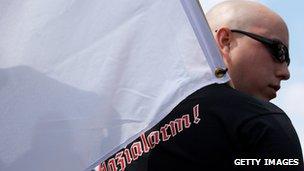German anti-Semitism 'deep-rooted' in society
- Published

The report says anti-Jewish sentiment is based on prejudice and ignorance
Anti-Jewish feeling is "significantly" entrenched in German society, according to a report by experts appointed by the Bundestag (parliament).
They say the internet has played a key role in spreading Holocaust denial, far-right and extreme Islamist views, according to the DPA news agency.
They also speak of "a wider acceptance in mainstream society of day-to-day anti-Jewish tirades and actions".
The expert group was set up in 2009 to report regularly on anti-Semitism.
The findings of their report were that anti-Jewish sentiment was "based on widespread prejudice, deeply-rooted cliches and also on plain ignorance of Jews and Judaism".
They added that the chanting of far-right slogans at football matches was a regular occurrence.
The report's authors put Germany midway in their assessment of other European countries in relation to the spread of anti-Semitism.
They see extremely high levels of anti-Jewish sentiment in parts of Poland, Hungary and Portugal.
Germany's Jewish population has experienced something of a revival since the fall of the Berlin Wall.
Before 1989, the population was below 30,000 but an influx of Jews, mainly from the former Soviet Union, has raised the number to 200,000.
Speaking on Friday to mark the anniversary of the 1942 Wannsee conference, when the Nazis' murder of millions of Jews was mapped out, President Christian Wulff pledged that Germany would keep the memory of the Holocaust alive and would never abandon the Jewish people.
- Published20 January 2012